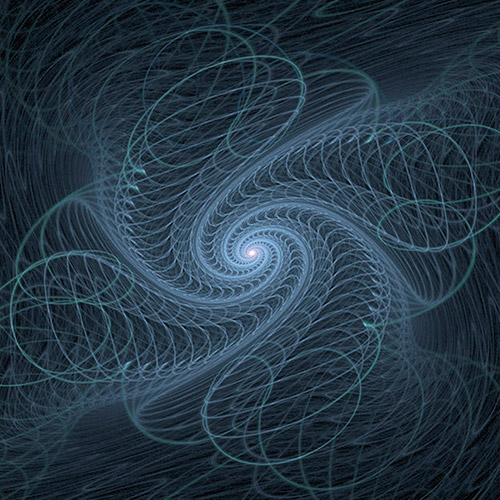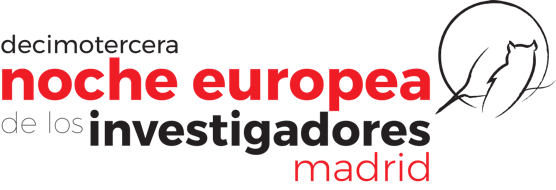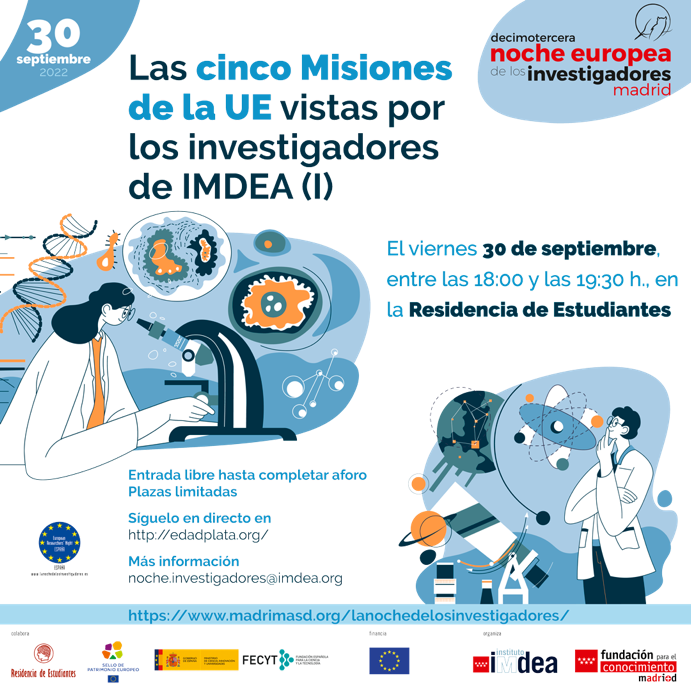
Curbing climate change, restoring our oceans, getting healthier food, fighting cancer or working towards smarter and more sustainable cities are the five EU missions that some IMDEA researchers told us about at the European Researchers’ Night in Madrid 2022.
October 5, 2022
The European Researchers’ Night in Madrid 2022

The 5 EU missions as seen by IMDEA researchers (I)
Last Friday, September 30, the Residencia de Estudiantes de Madrid was once again our host for The European Researchers’ Night in Madrid. As in the twelve previous editions, the Fundación para el Conocimiento madrimasd has coordinated all the activities prepared in Madrid.
José Manuel Torralba, researcher and director of IMDEA Materiales, and Manuel Carro, researcher and director of IMDEA Software, were the masters of ceremonies who introduced Pablo José Fernández Marcos (IMDEA Alimentación), Tania Hidalgo (IMDEA Energía), Isabel Gómez and María Dolores (Lola) Martín (IMDEA Materiales), Valle Palomo (IMDEA Nanociencia), Guillermo Suárez de Tangil (IMDEA Networks) and Pierre Ganty (IMDEA Software).

All of them spoke about the projects and lines of research they are working on in their institutes directly linked to the aim of helping to fulfil one of the 5 missions that the EU has set out in the Horizon Europe plan. In the talk they held among themselves and with the audience, many things became clear. For example, that at IMDEA we are extremely fortunate to have teams in which researchers with a very diverse background and specialisation collaborate, as we are aware that today’s problems, all of them very complex, need to be tackled from many scientific disciplines at the same time. It is therefore not surprising that some of our researchers work to help fulfil all or almost all of the EU’s missions, that others have a PhD in Pharmacy and work in the Energy sector, or that we research how to adapt the same material to fight cancer and obtain cleaner energy.
Listening to them, we realised that in today’s science, it is very important to have the collaboration of many people with very diverse backgrounds and trajectories, which contribute a great deal of richness and diversity. We understood also that training as an engineer, biologist, physicist, mathematician or… does not open up a specific path in research, it opens up many.
Several of the researchers explained some of the new strategies, such as immunotherapy or nanotechnology-based techniques, that are revolutionising the treatment and diagnosis of cancer and other diseases. These include also massive sequencing to identify specific cancer epitopes and design personalised vaccines that activate the immune response against the tumour.
They also explained that there are very promising new materials that will have applications that were difficult to imagine a few years ago. Through their exhaustive characterisation, the aim is to understand and improve their physicochemical properties with the aim of applying them in areas as diverse and important as energy, the environment or health, manufacturing new fuel cells, batteries, semiconductor materials, biomaterials for prostheses, degradable implants…
The development of more efficient and secure software and networks were also at the heart of the activity. They fight against illegal cryptocurrency mining and its negative effects on the environment, or against the development of malicious software, and can help reduce the use of chemicals in our agriculture, simulate how plastic travels through the oceans and thus improve the efficiency with which we dispose of it, or make the infrastructures of our cities work more efficiently.
The IMDEA researchers talked about their “experiments” and their “experiences”, about what has led them to dedicate themselves to the fascinating world of science. And they encouraged young people to follow them because for them there is nothing better than knowing that their work, which they are passionate about, is helping society to move forward.
The audience also participated with their questions, demonstrating that we are all very concerned about the present and the future of our planet: Why do the properties of materials change at the nanometric scale? Was graphene a fad or is it really an exceptional material? Is it the only one? These and other questions served to show that in science, not everything is a giant leap, not everything is an exceptional discovery, and that success is not always achieved the first time, but that even a step backwards or a discovery that at first seems minuscule helps a lot, and that being constant and trying again when the first attempt fails, is also a good way to success.
It is very important for us to know your opinion. Please let us know if you liked “The 5 EU missions as seen by IMDEA researchers (I)” (coordinated by @IMDEA_Software) by completing the following questionnaire https://madrimasd.org/lanochedelosinvestigadores/esquina-europea
If you missed our activity or want to remember it, you can watch it: https://youtu.be/TfHf-Yc1h9g

MADRIDNIGHT is a science outreach project, coordinated by the Fundación madri+d and funded by the European Union covered by the Horizon Europe Programme, belonging to the Marie Skłodowska-Curie actions under grant agreement No 101.061.343.


